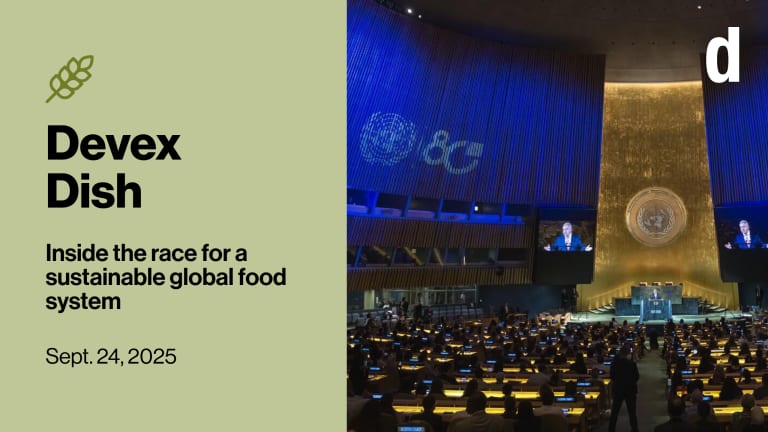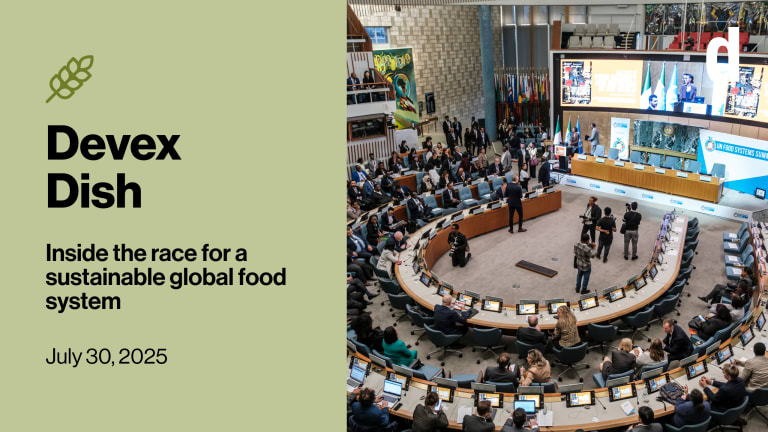
As you may have noticed, we at Devex have been riveted by the David Beasley/WFP vs. Elon Musk Twitter showdown. I’m pleased to bring Dish readers an update on this for the third week running.
This is a preview of Devex Dish
Sign up to this newsletter to get the inside track on how agriculture, nutrition, sustainability, and more are intersecting to remake the global food system in this weekly newsletter.
+ Join me this morning at 11 a.m. ET (5 p.m. CET) for a conversation with United States Rep. Dwight Evans of Pennsylvania to discuss U.S. leadership on food security and nutrition policy. Presented by CARE.
On Monday, Beasley, head of WFP, tweeted “A one-time appeal to billionaires” breaking down the cost for the agency to save 42 million people from famine. That would cost $6.6 billion, which Beasley is hoping to get out of the Tesla CEO if Musk sells stock in his company, as he offered to do several weeks ago. ICYMI: My colleagues Shabtai Gold and Stephanie Beasley (no relation) broke down how WFP arrived at that number last week.
The whole document Beasley released was so short I could almost reprint the entire 285 words here, but I’ll summarize:
• $3.5 billion for food and its delivery.
• $2 billion for cash and food vouchers.
• $700 million for country-specific costs to design, scale up, and manage the implementation of efficient and effective programs.
• $400 million for global and regional operations management, administration, and accountability.
Some commenters on Twitter wondered why it took WFP two weeks to release such a short list, when Musk asked for a full public accounting of WFP operations.
“Transparency and accountability are essential to us and our donors. WFP's financial statements, operational plans, audits & annual reports, etc. are all public. We have open books,” Beasley said in a subsequent tweet, including a link to a page — dated two weeks ago — outlining the organization’s accountability and transparency mechanisms.
When Shabtai asked for clarification from a WFP spokesperson on whether the document Beasley linked to was the detailed breakdown Musk had requested, he was sent an email with a series of links echoing those Beasley had tweeted. Another representative from WFP USA told me that all Elon Musk-related press inquiries were being routed to headquarters in Rome.
I do encourage you to check out the comments on Beasley’s thread — I know that’s a dangerous thing to say on the internet in 2021. But I also want to know what you think. What does this negotiation-via-Twitter say about the state of finance for malnutrition, and how effective is publicly begging billionaires for money? Let me know at dish@devex.com.
Empty plate
The COP 26 text was released last weekend at the conclusion of the two-week meeting, and didn’t include any mention of food systems, agriculture, or farming, despite activists’ insistence the food systems reform and climate change agendas be linked for the fate of both.
When it comes to food security, WFP urged swift action by world leaders to prevent a number of climate change-induced crises from getting worse, including 14,000 people facing famine-like conditions in Madagascar.
“The concern is that Madagascar isn’t going to be an outlier. This is actually sort of an early indicator of what the future is going to be,” WFP USA's Rebecca Middleton told me during a press briefing.
Number munching
40%
—That’s the percentage of the global food import bill accounted for by low- and middle-income countries. LMICs will see their aggregate food import bill rise by 20% year on year, according to FAO — a record increase and far higher than that expected in most industrialized nations.
The total global food import bill is expected to surpass $1.75 trillion — an all time high and 14% increase from the year before.
ICYMI: “The [COVID-19] pandemic not only reversed gains in global poverty reduction for the first time in a generation but also deepened the challenges of food insecurity and rising food prices for many millions of people,” a World Bank report published in June said.
Feeding the world
Watch: America’s global development and nutrition strategy: A conversation with Rep. Joaquin Castro
The Nutrition for Growth Summit is coming up in just three short weeks. We want to know what nutrition topic you’re most interested in, and who you’d like to see speak at a side event. Who do you most want to hear from as the nutrition community gathers for commitment making? Write to us at dish@devex.com.
Gorta catch ‘em all
This week’s featured job
Program Manager for Food and Agriculture
ClimateWorks Foundation
Remote work in Europe
British and Irish NGO Gorta Group is the product of five mergers in 13 years. Business Editor David Ainsworth talked to its CEO and found out how a group structure has allowed them to broaden focus on the food system to include more points on the supply chain — from humanitarian aid to helping organizations grow better food to building markets.
“At one end, growing green beans 400 miles from Nairobi, it’s all about agricultural processes,” he says. “But in Nairobi it’s all about food standards. And then those beans are going to be on a supermarket shelf in the U.K. 24 hours later and that’s all about transport and logistics. It’s important to be able to draw in the technical expertise to do all those things.”
Devex Pro: Why the Gorta Group has made 5 mergers in 13 years
+ A Devex Pro subscription offers deeper analysis of the development sector, exclusive digital events, and access to the world’s largest global development job board. Get access to these perks by signing up to our 15-day free trial.
Chew on this
Only 4 million hectares (9.88 million acres) out of a targeted 100 million in the Sahel have been successfully reached by the Great Green Wall program, an initiative to restore degraded ecosystems. [FAO]
U.N. officials are growing increasingly irritated by WFP head David Beasley’s unsanctioned diplomacy, including a recently planned trip to Sudan. [Foreign Policy]
Five U.N. agencies committed to assisting the School Meals Coalition, a group of more than 60 countries that aims to ensure every child in need has the opportunity to receive a nutritious meal in school by 2030. [UN News]









